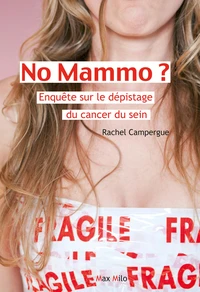Every year, the month of October is decked out in pink, with countless posters calling on people to crusade against breast cancer through mammography. Why are public health officials, doctors, associations and laboratories so keen to do this? Are women really well informed about the risks they run by undergoing screening? And do the promised benefits really exist?
Rachel Campergue was outraged by gynecologists' obstinacy in forcing her to undergo mammography.
What she discovered was appalling. By infantilizing women, public authorities promote confusion between prevention and screening. Doctors do not have adequate knowledge to ensure that the consents they obtain from their patients are indeed "informed". As for the associations, they are the agents of a juicy business that benefits above all the manufacturers of health products. The conclusion of this abundant, precise and humorous work is without appeal: a cancer detected by mammography does not equal a life saved, and if you choose to have one every two years, do so with full knowledge of the facts.
Every year, the month of October is decked out in pink, with countless posters calling on people to crusade against breast cancer through mammography. Why are public health officials, doctors, associations and laboratories so keen to do this? Are women really well informed about the risks they run by undergoing screening? And do the promised benefits really exist?
Rachel Campergue was outraged by gynecologists' obstinacy in forcing her to undergo mammography.
What she discovered was appalling. By infantilizing women, public authorities promote confusion between prevention and screening. Doctors do not have adequate knowledge to ensure that the consents they obtain from their patients are indeed "informed". As for the associations, they are the agents of a juicy business that benefits above all the manufacturers of health products. The conclusion of this abundant, precise and humorous work is without appeal: a cancer detected by mammography does not equal a life saved, and if you choose to have one every two years, do so with full knowledge of the facts.

 , qui est-ce ?
, qui est-ce ?